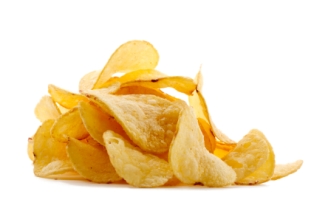Acryla’mired’
Doing One’s Best to Avoid Acrylamide
Last summer, I wrote about acrylamide ‚Äì a chemical that‚Äôs found most prevalently in potato chips, French fries, crackers, coffee and other carbohydrate-laden snacks.¬Ý Many animal studies have shown that when acrylamide is eaten in excess ‚Äì more than 40 micrograms, according to most estimates ‚Äì it contributes to various forms of cancer.¬Ý
Now comes word that there‚Äôs something else one needs to concern themselves with when it comes to acrylamide consumption:¬Ý heart disease.¬Ý
The more I write, the more clear things become with regards to why heart disease is the number one killer in America today.¬Ý Much of it has to do with lack of exercise, but it also has to do with the fact heart disease is linked to so many toxic chemicals like acrylamide.¬Ý
It‚Äôs estimated that acrylamide is found in as much as 40 percent of the average American‚Äôs caloric intake.¬Ý And because acrylamide is not an additive but rather a by-produce of the cooking process, it‚Äôs not something that can easily be easily eliminated from the diet.¬Ý It can, however, be reduced.
Before I get into how it can be reduced – and I’m guessing you already know what I’m going to suggest – let me relate the latest news on how acrylamide is linked to heart disease.
Polish researchers discovered the link after a group of participants for their study consumed an inordinate amount of acrylamide in the average day ‚Äì about 160 milligrams.¬Ý Most of the acrylamide consumed came from chief offenders like the aforementioned potato chip and French fry.¬Ý
After four weeks of observing the participants‚Äô acrylamide-crammed diet, the researchers found that their bodies were adversely affected.¬Ý For instance, antioxidants they consumed from other foods no longer pushed the acrylamide out of their bodies (strike one!), inflammation increased (strike two!) and the chemical make-up of their LDL levels changed (even though LDL is the ‚Äúbad‚Äù kind of cholesterol, these changes were not of the ‚Äúgood‚Äù kind ‚Äì strike three!).
These are three indicators of how at risk someone is for heart disease (you’re out!).
The full findings are published in this month’s edition of the American Journal of Clinical Nutrition.
So what‚Äôs the best way to eliminate acrylamide from one‚Äôs diet?¬Ý Well, unfortunately, it‚Äôs very difficult to eliminate it entirely ‚Äì particularly when it‚Äôs found in almost half of all calories consumed!¬Ý But by eating fewer cooked foods, it can be reduced rather significantly.¬Ý
If you‚Äôre already a healthy eater, reducing the number of cooked foods shouldn‚Äôt be too much of a change.¬Ý For example, one of the foods acrylamide is found in is in almonds.¬Ý Almonds are traditionally roasted, toasted or salted.¬Ý When they‚Äôre raw, they have far lesser amounts of acrylamide, one of the reasons why raw almonds are preferable to roasted.¬Ý
Another way to reduce acrylamide consumption is by having more vegetables served raw rather than cooked.¬Ý Again, acrylamide is produced through the cooking process when a food‚Äôs sugars and asparagines combine (and yes, the amino acid asparagine is found in large doses in asparagus, from which the name derives).¬Ý So the only way to reduce its prevalence is by reducing cooking.¬Ý
Acrylamide is one of those things that is almost impossible to avoid.¬Ý Its effects can be minimized, though, with preparation.¬Ý It‚Äôs sort of like to trying to stay dry when walking in the pouring rain:¬Ý You‚Äôre going to get wet, but how wet you get largely depends on your preparation (e.g. umbrella, rain jacket, galoshes, walking quickly as opposed to slowly).¬Ý With acrylamide, you‚Äôre going to consume it, but how much you consume of it depends on your diet (e.g. avoiding processed foods and eating as many raw vegetables, fruits, whole grains and unpasteurized milk as possible).
Sources:
Science Daily
Acrylamide Facts
Related Posts
 
|
Enjoy this article? We guarantee your privacy. Your email address will NEVER be rented, traded or sold. |
Visit my new site: Self Help On The Web
 |
 |
Posted: March 9th, 2009 under Cancer.
Tags: acrylamide, french fries, potato chips








Comments
Comment from Krysofeurope
Time March 10, 2009 at 7:57 pm
As an esthetician/skin care therapist I always concern The Beauty from The Inside Out. That is simple, our lifestyle show on body what we eat, how we care to feel good and healthy. Skin Care products are very important as our inner beauty care. I appreciate and Thank you for the Natural Health newsletters I learn more and stay up date with resent info. Sincerely,
Krystyna Mazur
Comment from Reuben
Time March 11, 2009 at 8:15 am
Excellent article, Frank! I had been aware of the danger of potato chips due to the excess heat they go through during processing. I also heard of the danger of eating foods cooked in oil (the danger being in the heating of the oil itself, since it changes the chemical compounds of the oil) but I haven’t heard of the danger of cooking vegetables! I knew the cooking process of vegetables should be minimized to prevent destroying all the nutrients, but never heard about the development of acrylamide by simply using water. That’s the first time I’ve heard of that! Thanks for bringing that to our attention. Of course, it all makes sense, since our ancestors would have eaten all natural, unprocessed foods from the earth in raw form!
Comment from Isotonix
Time March 12, 2009 at 11:48 am
Thanks for the info Frank. I don’t eat potato chips, butI never knew about the bad chemicals in asparagus. Unfortunatly it’s one of my favorite vegtables. Maybe I’ll try and cook them a little less from now on.